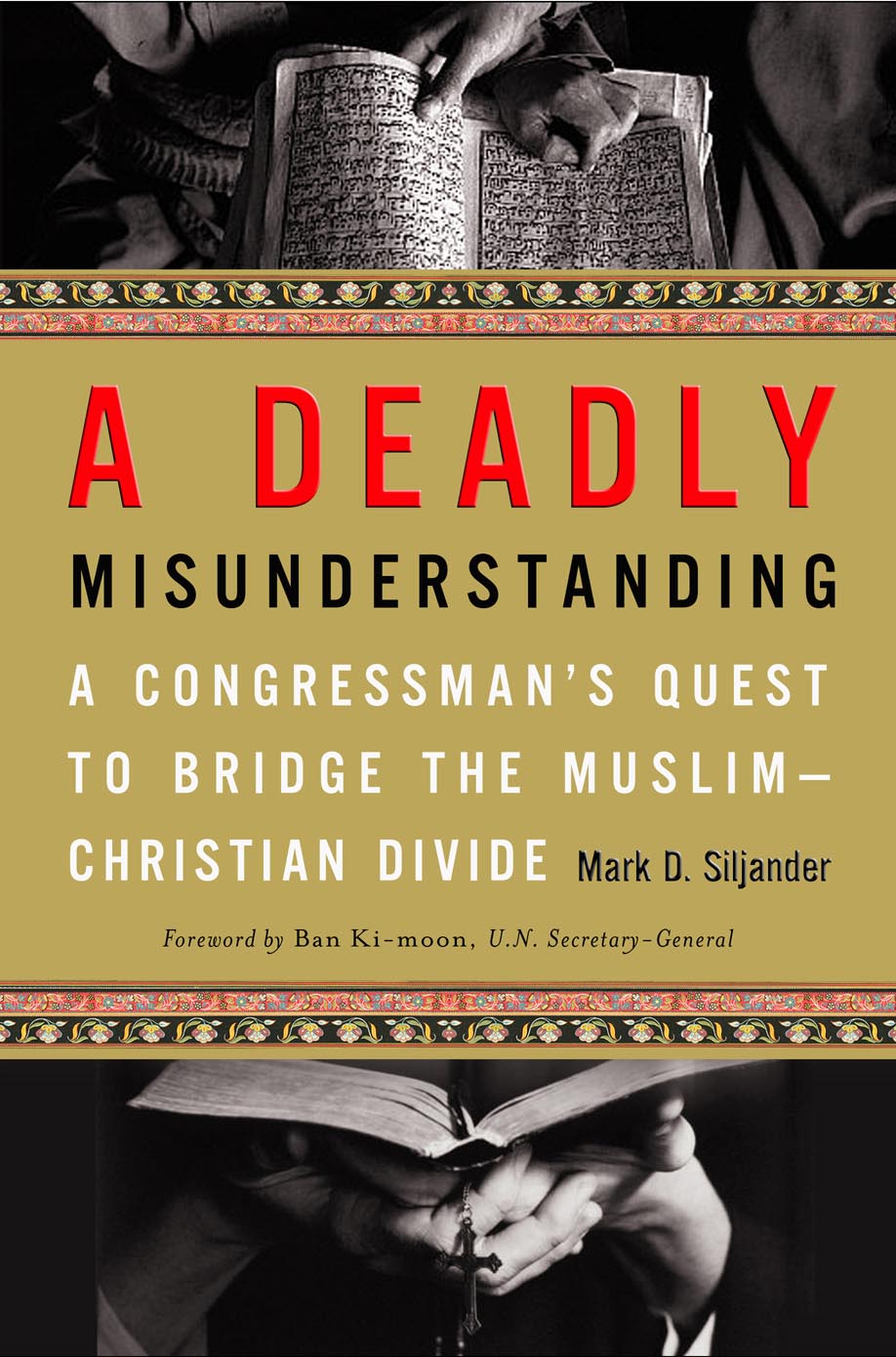I don’t typically print other people’s reviews of my books in my blog. But for this one, an exception. In today’s edition of The Washington Times there is a wonderful review of A Deadly Misunderstanding by veteran foreign correspondent (and three-time Pulitzer nominee) Martin Sieff.
You can read the full text here — but Mr. Sieff’s review is so articulate and impassioned that I feel compelled to reprint it in full below:
Book Review: From Enmity to Friendship
A Deadly Misunderstanding: A Congressman’s Quest to Bridge the Muslim-Christian Divide
By Mark D. Siljander
HarperCollins, New York, $24.95, 260 pages
Reviewed by Martin Sieff | Friday, August 7, 2009
The Washington Times
As the first decade of the 21st century draws to a close, the issues of global war and peace hinge to an unprecedented degree on the vast chasm between the Christian and Muslim faiths. Mark D. Siljander’s remarkable new book, therefore, could not be more timely.
Books preaching interfaith good will and reconciliation, of course, are not new. But when Mr. Siljander’s work wins the enthusiastic pre-publication praise of former U.S. Attorney General Edwin Meese of the Heritage Foundation, former Secretary of State James A. Baker III and Ban Ki-moon, the secretary-general of the United Nations, it is clear that something exceptional has appeared. Mr. Siljander, a Reagan Republican, devout Christian, former Evangelical and former House member from Michigan, does not disappoint. A good and extraordinary man has written a quite extraordinarily good book.
Mr. Siljander’s work is riveting on many levels and in many different ways. It is an autobiographical voyage of discovery about a decent and devout American politician who came to discover that his own faith was far vaster, more profound and more tolerant than he had ever dreamed.
It is also the account of an immense journey in moral and geographical terms that led him to discover men of the greatest good faith and spiritual depth in the Protestant, Catholic Christian and Muslim worlds. Mr. Siljander courageously traveled into the heart of Sudan, Pakistan and Libya, where he describes dozens of his own encounters with Muslim leaders of good will, many of them courageously preaching and teaching under intolerant and mercilessly repressive governments.
Yet Mr. Siljander is no pie-in-the-sky impractical dreamer. As a veteran politician, he understands the nature and danger of the extreme Islamist fundamentalist challenge exceptionally clearly, and his insights on the problem are some of the clearest and most cogent that have yet been published.
He recognizes that the real secret of extreme Islamism’s appeal is its ideology and goal of forging “one gigantic Islamic state under Sharia law, transcending current national boundaries and placing all infidels in subjugation.” He also realizes that “no military force on Earth can defeat an ideology bound together by passion.” But that, in turn, reveals the potentially fatal flaw in the huge Islamist facade: “If you can effectively find a flaw in its ideology and widely expose that flaw, you crack apart the organization’s coherence.”
Mr. Siljander teaches us a usually overlooked profound truth: The great issues of peace and war, love and hate, between nations, peoples and enormous religious faiths are usually in the control of only a handful of people. “In the Middle East and North Africa, there are arguably thirty key Muslim clerics who hold the power to influence the vast majority of Islam’s followers including hundreds of millions in Islamic Asia.”
Mr. Siljander argues that the way to reach such people and turn their potential hatred, fear, ignorance of the Other and enmity into lasting and enduring friendship is to apply the great teachings of the Sermon on the Mount in real, immediate and practical terms. “My friends and I believe that there is at least a handful of such people in every city in the world,” he writes. “In every community, there are but a handful of potential troublemakers — and they can be reached through a handful of influential peacemakers. … We don’t need millions or thousands. We only need a handful in every community.”
This extraordinary idea is at the core of Mr. Siljander’s book, but there are many other remarkable riches there as well. He quotes extensively from George Lamsa’s all-too-little-known 1933 translation into English of the Peshitta, the earliest known Aramaic version of the New Testament, to counter many almost universally-held misconceptions about Jesus’ teachings.
Mr. Siljander’s refutation of the slur of “Christ-killer” against the Jewish people is so cogent and remarkable it is worth the purchase of the entire book in itself: “Ironically, the people who actually performed the trial, sentence and execution [of Jesus] were the forebears not of today’s Jews but of today’s Italians — a people who have over the centuries been among the most committed followers of the carpenter from Galilee. Does anyone seriously think we should label Italians ‘Christ-killers’?” he asks. “The very idea is ludicrous.”
Mr. Siljander has written a book of enormous courage and spiritual power. It is essential reading for every Christian, Muslim and Jew of good will around the world. There are hundreds of millions, probably billions, of such people — and they all need to hear Mr. Siljander’s voice.
Martin Sieff is a veteran foreign correspondent. His most recent book is “The Politically Incorrect Guide to the Middle East.”


Wow, what a glorious review! I will definitely check out this book, which seems to be bridging a lot of important gaps and setting straight some fatal misconceptions. Thanks, John, for bringing it to our attention.
I read the book soon after it came out and was surprised and amazed. Former Congressman Siljander does a terrific job of of exposing some inconvenient truths that will get any “thinking person” thinking. He is a brave man and has done the world a service by writing this book. I encourage everyone to suspend your disbelief and read it. You’ll be glad you did.